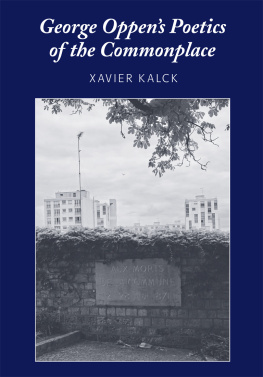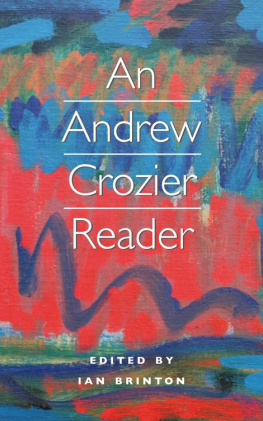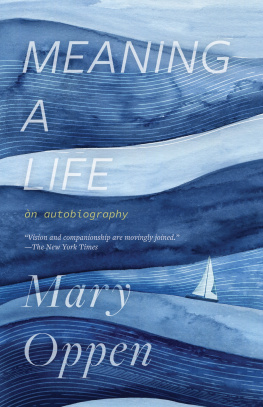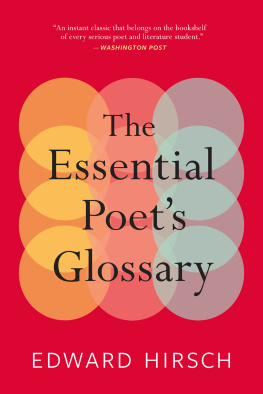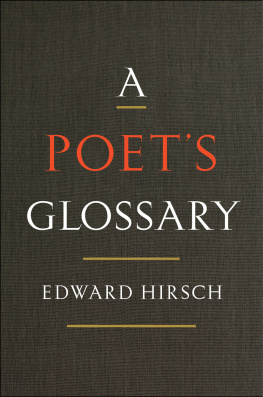Table of Contents
Page List
This book is part of the Peter Lang Humanities list.
Every volume is peer reviewed and meets
the highest quality standards for content and production.
Xavier Kalck
George Oppens Poetics
of the Commonplace
Library of Congress Cataloging-in-Publication Data
Names: Kalck, Xavier, author.
Title: George Oppens poetics of the commonplace / Xavier Kalck.
Description: New York: Peter Lang, 2017.
Includes bibliographical references and index.
Identifiers: LCCN 2017029268 | ISBN 978-1-4331-4305-2 (hardcover: alk. paper)
ISBN 978-1-4331-4306-9 (ebook pdf) | ISBN 978-1-4331-4307-6 (epub)
ISBN 978-1-4331-4308-3 (mobi)
Subjects: LCSH: Oppen, GeorgeCriticism and interpretation
Classification: LCC PS3529.P54 Z74 2017 | DDC 811/.52dc23
LC record available at https://lccn.loc.gov/2017029268
DOI 10.3726/b11599
Bibliographic information published by Die Deutsche Nationalbibliothek.
Die Deutsche Nationalbibliothek lists this publication in the Deutsche Nationalbibliografie; detailed bibliographic data are available on the Internet at http://dnb.d-nb.de/.
Cover photo: Plaque in commemoration of the Paris Commune at Pre-Lachaise Cemetery referenced in Oppens poem Eros, NCP 120.(Photo by Xavier Kalck)
2017 Peter Lang Publishing, Inc., New York
29 Broadway, 18th floor, New York, NY 10006
www.peterlang.com
All rights reserved.
Reprint or reproduction, even partially, in all forms such as microfilm, xerography, microfiche, microcard, and offset strictly prohibited.
About the author(s)/editor(s)
Xavier Kalck is Associate Professor at Paris-Sorbonne University, where he received his PhD in Objectivist poetics. He is the author of Muted Strings: Louis MacNeices The Burning Perch (2015). He also edited Anthony Barnetts Miscanthus: Selected & New Poems (2005).
About the book
Few poets have been as adamant about the uselessness of their art in the face of history as American poet George Oppen (19081984), and yet, few poets have been as viscerally convinced of the important role of the poem in restoring meaning to our words. Oppen came to maturity between two world wars, at the time of the Depression, and gave up poetry just when he had embraced it. In the 1960s and 1970s, however, his new work seemed to many poets and critics to represent the epitome of poetic virtue in dark times. Whereas Oppen wrote of the lost sense of the commonplace, his readers found in his poetry the means to reclaim the poets role within the community.
George Oppens Poetics of the Commonplace offers the first survey of the critical consensus which has now built up around the poetry of George Oppen, after over two decades of substantial interest in his work. It proposes a comprehensive perspective on Oppen and the criticism devoted to Oppen, from the Objectivist strain in American poetry to the thinkers, such as Heidegger, Levinas, Marx and Adorno, which critics have brought to bear on Oppens poetry, to pave the way for the consideration and exemplification of a new methodology which sheds a critical light on the ideas and practices in contemporary poetics, through well-researched close readings.
This eBook can be cited
This edition of the eBook can be cited. To enable this we have marked the start and end of a page. In cases where a word straddles a page break, the marker is placed inside the word at exactly the same position as in the physical book. This means that occasionally a word might be bifurcated by this marker.
| vii
Monographs devoted to a single author are often structured around a roughly linear chronology which follows the production of the work and its receptiona lifes work and the works lifeleaving the reader with little by way of justification beyond the relevance of said author, whether it was meant to be demonstrated, questioned, or whether relevance must quite simply be assumed. Multiauthor monographs may seem to present something a little different, yet they too will often prove equally linear, if in a slightly subtler way, by imposing the linearity of a conceptual framework on a reluctant variety of texts and contexts. This book hopes to offer an alternative; however, even if successful, its outline may come across as somewhat unsettling. Although this is a single author monograph, which focuses on the reception of the work of George Oppen, it is not essentially concerned with historiography. This book is an empirical investigation into what literary criticism can hope to achieve and into the fabric, and fabrications, of literary knowledgehow it is made, assembled, and why it sometimes tells a lie. I have therefore chosen to present this exploration as such, with its occasional digressions and repetitions, instead of packaging my findings into more readily digestible precepts. If my reader is kind and patient enough, I firmly believe this explicitly experimental method will prove most adequate for a study devoted to issues of methodology. For methodology is not only a crucial aspect of this book, it is the very subject of this book. What the commonplace means for Oppens vii | viii poetics and how this translates into a common awareness of a shared history is a question that cannot be answered by literary critics unless the commonplaces that make up the critical consensus are also discussed. I will go as far as to say that this analogy is inherent in Oppens own practice and in the poetic goals he set for himself, that require critics to engage with his work from the communal perspective of a common language, which puts great pressure on the truthfulness of ones own critical discourse. I insist on the matter because I must address the perhaps unusually critical slant of this piece of literary criticism, which could lead some to believe that my remarks are at times directed ad hominem. They are not. When I question specific positions and specific critical beliefs, I aim at clarifying these positions and beliefs as objectively as possible for the sake of methodological progress, and not in the name of a competing school, coterie, theory, or out of personal preference. I can only hope that my carefully detailed close readings of the secondary sources, which make up a large part of my primary sources, will testify to the integrity of my endeavor.
| ix
I am immensely grateful to Michael Heller for his time and kind notes, and to Hlne Aji and Denis Lagae-Devoldre for their precious advice. Warm thanks are due to Rachel Blau DuPlessis, who encouraged me to revise and improve the initial manuscript. This book would not be without the support of Elisabeth Angel-Perez, head of the VALE research center at Paris-Sorbonne University, and the help of the Paris-Sorbonne University commission for research.
Copyright Credits
By George Oppen, from NEW COLLECTED POEMS, copyright 1934 by the Objectivist Press, copyright 1960, 1961, 1962, 1963, 1964, 1965, 1967, 1968, 1969, 1970, 1971, 1972, 1973, 1974, 1975, 1976, 1977, 1978, 1981 by George Oppen, copyright 1985, 2002, 2008 by Linda Oppen. Reprinted by permission of New Directions Publishing Corp.
Eighth Elegy By Rainer Maria Rilke, translated by J. B. Leishman, from POSSIBILITY OF BEING, copyright 1977 by New Directions Publishing Corp. Reprinted by permission of New Directions Publishing Corp.

